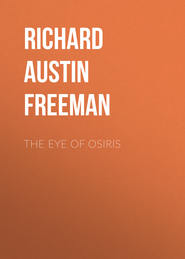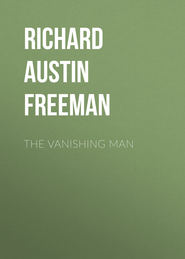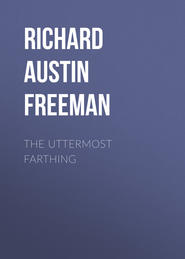По всем вопросам обращайтесь на: info@litportal.ru
(©) 2003-2024.
✖
The Red Thumb Mark
Настройки чтения
Размер шрифта
Высота строк
Поля
"I see you have commenced work on our problem," I remarked as, in response to a double ring of the electric bell, Polton entered with the materials for our repast.
"Yes," answered Thorndyke. "I have opened the campaign, supported, as usual, by my trusty chief-of-staff; eh! Polton?"
The little man, whose intellectual, refined countenance and dignified bearing seemed oddly out of character with the tea-tray that he carried, smiled proudly, and, with a glance of affectionate admiration at my friend, replied—
"Yes, sir. We haven't been letting the grass grow under our feet. There's a beautiful negative washing upstairs and a bromide enlargement too, which will be mounted and dried by the time you have finished your breakfast."
"A wonderful man that, Jervis," my friend observed as his assistant retired. "Looks like a rural dean or a chancery judge, and was obviously intended by Nature to be a professor of physics. As an actual fact he was first a watchmaker, then a maker of optical instruments, and now he is mechanical factotum to a medical jurist. He is my right-hand, is Polton; takes an idea before you have time to utter it—but you will make his more intimate acquaintance by-and-by."
"Where did you pick him up?" I asked.
"He was an in-patient at the hospital when I first met him, miserably ill and broken, a victim of poverty and undeserved misfortune. I gave him one or two little jobs, and when I found what class of man he was I took him permanently into my service. He is perfectly devoted to me, and his gratitude is as boundless as it is uncalled for."
"What are the photographs he was referring to?" I asked.
"He is making an enlarged facsimile of one of the thumb-prints on bromide paper and a negative of the same size in case we want the print repeated."
"You evidently have some expectation of being able to help poor Hornby," said I, "though I cannot imagine how you propose to go to work. To me his case seems as hopeless a one as it is possible to conceive. One doesn't like to condemn him, but yet his innocence seems almost unthinkable."
"It does certainly look like a hopeless case," Thorndyke agreed, "and I see no way out of it at present. But I make it a rule, in all cases, to proceed on the strictly classical lines of inductive inquiry—collect facts, make hypotheses, test them and seek for verification. And I always endeavour to keep a perfectly open mind.
"Now, in the present case, assuming, as we must, that the robbery has actually taken place, there are four conceivable hypotheses: (1) that the robbery was committed by Reuben Hornby; (2) that it was committed by Walter Hornby; (3) that it was committed by John Hornby, or (4) that it was committed by some other person or persons.
"The last hypothesis I propose to disregard for the present and confine myself to the examination of the other three."
"You don't think it possible that Mr. Hornby could have stolen the diamonds out of his own safe?" I exclaimed.
"I incline at present to no one theory of the matter," replied Thorndyke. "I merely state the hypotheses. John Hornby had access to the diamonds, therefore it is possible that he stole them."
"But surely he was responsible to the owners."
"Not in the absence of gross negligence, which the owners would have difficulty in proving. You see, he was what is called a gratuitous bailee, and in such a case no responsibility for loss lies with the bailee unless there has been gross negligence."
"But the thumb-mark, my dear fellow!" I exclaimed. "How can you possibly get over that?"
"I don't know that I can," answered Thorndyke calmly; "but I see you are taking the same view as the police, who persist in regarding a finger-print as a kind of magical touchstone, a final proof, beyond which inquiry need not go. Now, this is an entire mistake. A finger-print is merely a fact—a very important and significant one, I admit—but still a fact, which, like any other fact, requires to be weighed and measured with reference to its evidential value."
"And what do you propose to do first?"
"I shall first satisfy myself that the suspected thumb-print is identical in character with that of Reuben Hornby—of which, however, I have very little doubt, for the finger-print experts may fairly be trusted in their own speciality."
"And then?"
"I shall collect fresh facts, in which I look to you for assistance, and, if we have finished breakfast, I may as well induct you into your new duties."
He rose and rang the bell, and then, fetching from the office four small, paper-covered notebooks, laid them before me on the table.
"One of these books," said he, "we will devote to data concerning Reuben Hornby. You will find out anything you can—anything, mind, no matter how trivial or apparently irrelevant—in any way connected with him and enter it in this book." He wrote on the cover "Reuben Hornby" and passed the book to me. "In this second book you will, in like manner, enter anything that you can learn about Walter Hornby, and, in the third book, data concerning John Hornby. As to the fourth book, you will keep that for stray facts connected with the case but not coming under either of the other headings. And now let us look at the product of Polton's industry."
He took from his assistant's hand a photograph ten inches long by eight broad, done on glazed bromide paper and mounted flatly on stiff card. It showed a greatly magnified facsimile of one of the thumb-prints, in which all the minute details, such as the orifices of the sweat glands and trifling irregularities in the ridges, which, in the original, could be seen only with the aid of a lens, were plainly visible to the naked eye. Moreover, the entire print was covered by a network of fine black lines, by which it was divided into a multitude of small squares, each square being distinguished by a number.
"Excellent, Polton," said Thorndyke approvingly; "a most admirable enlargement. You see, Jervis, we have photographed the thumb-print in contact with a numbered micrometer divided into square twelfths of an inch. The magnification is eight diameters, so that the squares are here each two-thirds of an inch in diameter. I have a number of these micrometers of different scales, and I find them invaluable in examining cheques, doubtful signatures and such like. I see you have packed up the camera and the microscope, Polton; have you put in the micrometer?"
"Yes, sir," replied Polton, "and the six-inch objective and the low-power eye-piece. Everything is in the case; and I have put 'special rapid' plates into the dark-slides in case the light should be bad."
"Then we will go forth and beard the Scotland Yard lions in their den," said Thorndyke, putting on his hat and gloves.
"But surely," said I, "you are not going to drag that great microscope to Scotland Yard, when you only want eight diameters. Haven't you a dissecting microscope or some other portable instrument?"
"We have a most delightful instrument of the dissecting type, of Polton's own make—he shall show it to you. But I may have need of a more powerful instrument—and here let me give you a word of warning: whatever you may see me do, make no comments before the officials. We are seeking information, not giving it, you understand."
At this moment the little brass knocker on the inner door—the outer oak being open—uttered a timid and apologetic rat-tat.
"Who the deuce can that be?" muttered Thorndyke, replacing the microscope on the table. He strode across to the door and opened it somewhat brusquely, but immediately whisked his hat off, and I then perceived a lady standing on the threshold.
"Dr. Thorndyke?" she inquired, and as my colleague bowed, she continued, "I ought to have written to ask for an appointment but the matter is rather urgent—it concerns Mr. Reuben Hornby and I only learned from him this morning that he had consulted you."
"Pray come in," said Thorndyke. "Dr. Jervis and I were just setting out for Scotland Yard on this very business. Let me present you to my colleague, who is working up the case with me."
Our visitor, a tall handsome girl of twenty or thereabouts, returned my bow and remarked with perfect self-possession, "My name is Gibson—Miss Juliet Gibson. My business is of a very simple character and need not detain you many minutes."
She seated herself in the chair that Thorndyke placed for her, and continued in a brisk and business-like manner—
"I must tell you who I am in order to explain my visit to you. For the last six years I have lived with Mr. and Mrs. Hornby, although I am no relation to them. I first came to the house as a sort of companion to Mrs. Hornby, though, as I was only fifteen at the time, I need hardly say that my duties were not very onerous; in fact, I think Mrs. Hornby took me because I was an orphan without the proper means of getting a livelihood, and she had no children of her own.
"Three years ago I came into a little fortune which rendered me independent; but I had been so happy with my kind friends that I asked to be allowed to remain with them, and there I have been ever since in the position of an adopted daughter. Naturally, I have seen a great deal of their nephews, who spend a good part of their time at the house, and I need not tell you that the horrible charge against Reuben has fallen upon us like a thunderbolt. Now, what I have come to say to you is this: I do not believe that Reuben stole those diamonds. It is entirely out of character with all my previous experience of him. I am convinced that he is innocent, and I am prepared to back my opinion."
"In what way?" asked Thorndyke.
"By supplying the sinews of war," replied Miss Gibson. "I understand that legal advice and assistance involves considerable expense."
"I am afraid you are quite correctly informed," said Thorndyke.
"Well, Reuben's pecuniary resources are, I am sure, quite small, so it is necessary for his friends to support him, and I want you to promise me that nothing shall be left undone that might help to prove his innocence if I make myself responsible for any costs that he is unable to meet. I should prefer, of course, not to appear in the matter, if it could be avoided."
"Your friendship is of an eminently practical kind, Miss Gibson," said my colleague, with a smile. "As a matter of fact, the costs are no affair of mine. If the occasion arose for the exercise of your generosity you would have to approach Mr. Reuben's solicitor through the medium of your guardian, Mr. Hornby, and with the consent of the accused. But I do not suppose the occasion will arise, although I am very glad you called, as you may be able to give us valuable assistance in other ways. For example, you might answer one or two apparently impertinent questions."
"I should not consider any question impertinent that you considered necessary to ask," our visitor replied.
"Then," said Thorndyke, "I will venture to inquire if any special relations exist between you and Mr. Reuben."
"You look for the inevitable motive in a woman," said Miss Gibson, laughing and flushing a little. "No, there have been no tender passages between Reuben and me. We are merely old and intimate friends; in fact, there is what I may call a tendency in another direction—Walter Hornby."
"Do you mean that you are engaged to Mr. Walter?"
"Oh, no," she replied; "but he has asked me to marry him—he has asked me, in fact, more than once; and I really believe that he has a sincere attachment to me."
She made this latter statement with an odd air, as though the thing asserted were curious and rather incredible, and the tone was evidently noticed by Thorndyke as well as me for he rejoined—









